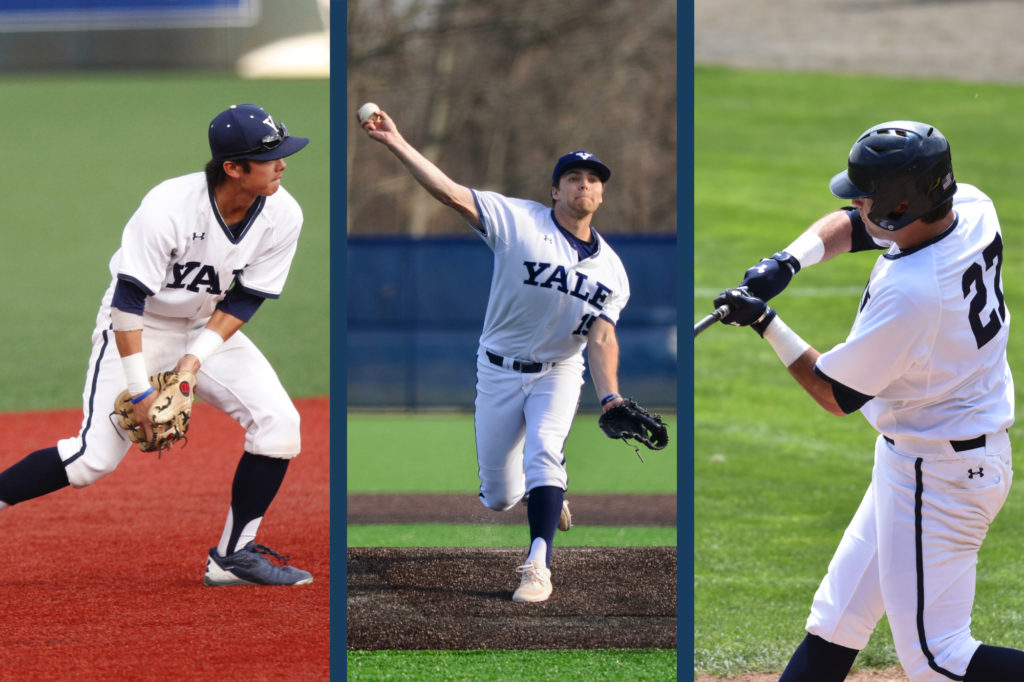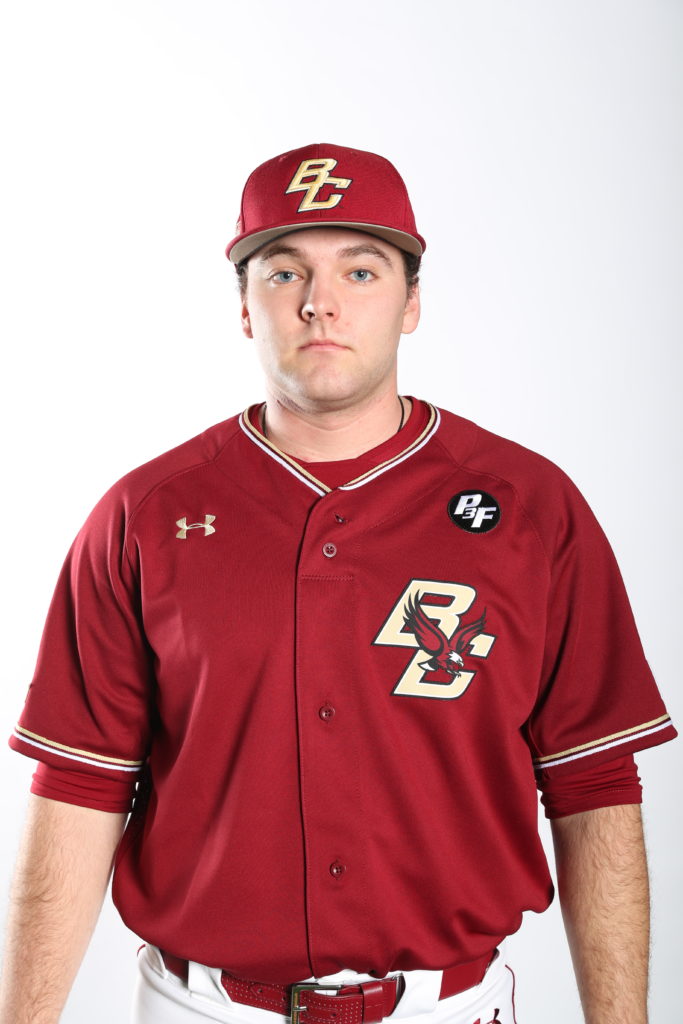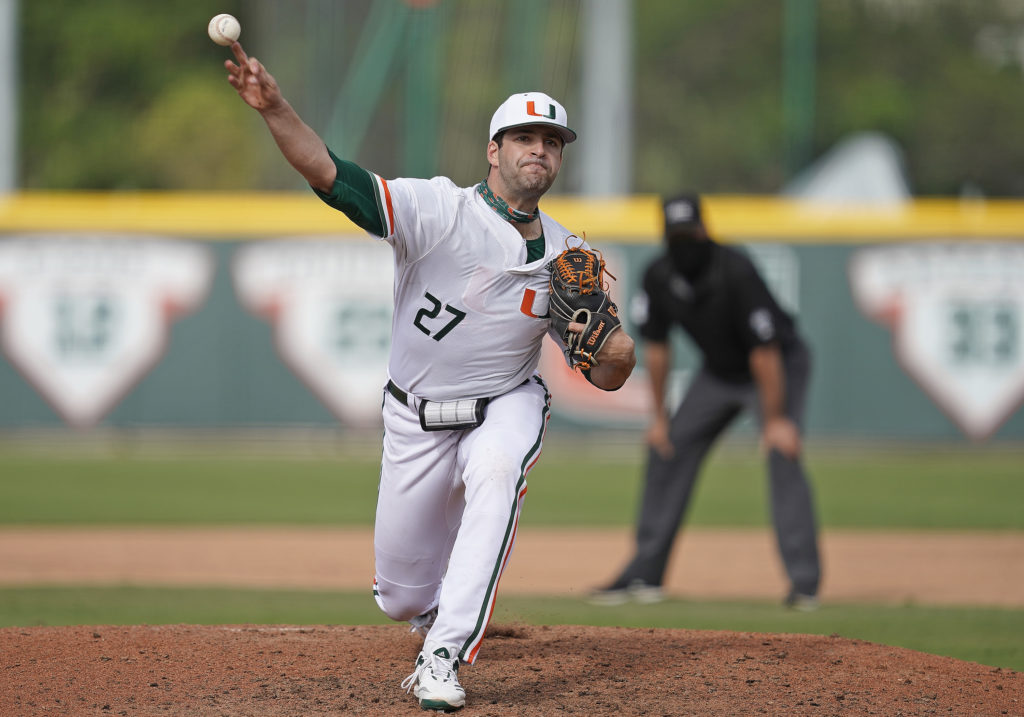BASEBALL: Grad transfers find stride at Boston College, Johns Hopkins and UMiami
Three Yale baseball alumni — Boston College’s Alex Stiegler ’20, Miami’s Benny Wanger ’19 and John Hopkins’ Dai Dai Otaka ’20 — are continuing their collegiate baseball careers as graduate transfers this year.

Courtesy of Miami Athletics/Richard Lewis
It is Feb. 21, in only the third inning of a 1–1 ballgame against Charleston Southern (0–3, 0–0 Big South), and No. 22 Boston College (6–1, 2–1 ACC) has made a surprising call to the bullpen.
The Eagles’ starter, freshman right-handed pitcher Joe Vetrano, has pitched well in his first-ever collegiate game, allowing just one unearned run with two strikeouts to boot. Nevertheless, Boston College coach Mike Gambino has decided to make a pitching change to begin the bottom of the third. Jogging out of the bullpen in his season debut is the Eagles’ new offseason acquisition and a very familiar face for virtual New Haven onlookers: Alex Stiegler ’20, a former Yale pitcher and captain donning the Maroon and Gold as a graduate transfer. Four scoreless innings and five strikeouts later, the newly acquired Dallas native appeared poised for a season of high-octane production for one of the top-ranked teams in the country.
Yet, for Bulldogs fans, his presence is the latest in a long line of what-ifs and what-could-have-beens, had the Blue and White’s 2020 baseball campaign not been so agonizingly spoiled by the COVID-19 pandemic. In fact, two additional former Yale players have found new homes as graduate transfer students: infielder Dai Dai Otaka ’20 at Johns Hopkins and pitcher/infielder Benny Wanger ’19, last spring at the University of Southern California (3–3, 0–0 Pac-12) and this year at the University of Miami (3–3, 1–2 ACC).
“I couldn’t be happier that these guys found good fits after Yale,” head baseball coach John Stuper said. “They are three of my favorite people, and I think it also puts on display the kind of talent we’ve been able to bring into the program. I’m in touch with them every week and certainly follow their games.”

Last year, when the spring athletic season was cut short for colleges across the country, the NCAA granted all spring sports athletes an extra year of eligibility. However, the Ivy League decided at that time to maintain its longstanding eligibility policies that did not allow athletes to compete as graduate students. Last month, however, the Ivy League Council of Presidents voted in an unprecedented move to grant senior student-athletes an extra year of eligibility as a graduate student at their current university for the 2021-22 academic year only.
The weeks that followed Stiegler and Otaka’s graduation from Yale saw both find new homes as graduate transfers at Boston College and Johns Hopkins, respectively, so as to take advantage of their extra year of eligibility.
“Being a grad transfer has been a cool experience, something I think not many have had before COVID-19,” Otaka said. “Not only has it given me the opportunity to get a master’s while still playing baseball, it’s also given me the chance to see another college team and another division.”
Otaka said that his team has started practices and is gearing up “for when it’s go-time.”

Stiegler, who was elected team captain during his senior year, which COVID-19 cut short, said goodbye to a Blue and White career that saw some of the most dominant pitching performances from a Bulldog in recent memory. His junior year in particular stands out, as Stiegler’s 76 strikeouts amassed in 76 innings thrown, along with a 3.38 ERA, earned him First-Team All-Ivy League honors. While the Texan stumbled a bit in his fourth and final games played for Yale as a senior — conceding 12 earned runs in 18 innings pitched — Stiegler appears to have picked up right where his junior self left off in his small sample size of games as an Eagle. To date, he has compiled a whopping 13 strikeouts in only eight innings pitched to go along with a 1.08 ERA.
Stiegler said that he did not hold himself to any expectations when joining the Boston College team.
“I knew I was coming into a program that would have some players already here who were slotted into roles,” Stiegler said. “I was honestly just happy to be playing baseball again and was excited to see where I might fit in. Initially, they thought I could be a closer type of guy or a long relief, and then we had some guys get sick and I began starting games in our intrasquads. Then, they said maybe you could be a starter.”
In his first weekend series against Charleston Southern, Stiegler retained his role as the team’s starter, despite the fact that he did not pitch the first two innings. The Eagles employed an “opener” strategy, in which a pitcher comes in to pitch for an inning or two before handing the ball over to another pitcher to pitch for extended innings. While most starting pitchers are opposed to the idea of someone opening a game for them, the strategy fits Stiegler’s strengths quite well. In the three starts he made last year as a Bulldog during the shortened 2020 season, Stiegler struggled in the first inning of all three contests before settling in.
Stiegler, while originally not a fan of the opener concept, said that he has come around to the idea after seeing it used in practice and competition. Using an opener has given Stiegler the chance to scope out the top of the lineup before he has to throw a pitch — valuable scouting information that helped him dominate in his first appearance.
Over the past few weeks, another revolution that has sparked discussions on collegiate baseball social media is the increased shows of emotion on the field from pitchers. ESPN and MLB’s Rob Friedman, better known as “PitchingNinja,” calls them “college pitcher psychopaths,” and his tweets have garnered widespread attention since the season started.
The trend is seen as a response to the general “Let the Kids Play” movement that is occurring in the major leagues as younger players eschew old traditions and start showing more emotion on the field. This was generally limited to hitters who would “bat-flip” after important home runs, but now pitchers at the collegiate level have begun responding with celebrations of their own after getting some big outs.

Some players have taken it a bit too far, according to Stiegler and Wanger. Both former Yalie pitchers are in favor of showing emotion on the field but agreed that there is a line that can be crossed where another player’s actions can be seen as disrespectful.
“I think it’s good to an extent,” Wanger said when asked about the “college pitcher psychopaths.” “I think that some of those guys have taken it way too far. You know I’m all for showing emotion when you pitch, but screaming at the other team is definitely not my style. I think it’s great to show emotion when you get out of a big spot but you can’t be doing it every single day, especially when you try and keep a level head during this game.”
As a high-leverage reliever, Wanger has stayed true to his word and has been even-tempered in his appearances for the Hurricanes. In his debut series against the then-No. 1 Florida Gators, Wanger closed out a 13-inning, come-from-behind victory with a two-inning relief appearance, earning him the win. Through four appearances, Wanger has accumulated 4.1 innings of work with a 4.15 ERA and two strikeouts. Wanger has only made three plate appearances and has yet to pick up his first hit as a Cane, but he has reached base twice on a walk and a hit by pitch.
Wanger and the University of Miami will face off against Stiegler’s Boston College squad in a three-game series beginning April 30.
Jared Fel | jared.fel@yale.edu
Eugenio Garza Garcia | eugenio.garzagarcia@yale.edu








